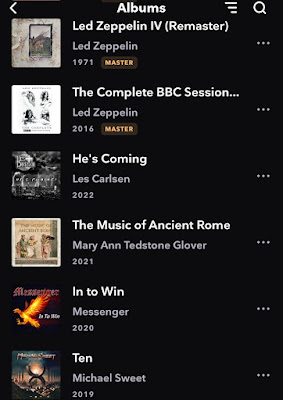Over the past ten years I have used the phrase "a shared journey of discovery" to describe my vision of education. It is featured in the background to my Twitter profile, and the truth of it was proved once again this fall thanks to one of my freshman students. Because of her I became friends with a scholar and composer in England whose work uncovering the sounds of ancient Roman music has made its way into my classroom.
Cool Stuff
The Latin students at
St. Theodore Guerin Catholic High School have a podcast called
Rostra (
Spotify,
Apple,
Amazon,
YouTube), and in each episode I interview one of them on a topic of his or her choosing. On Sunday evening, October 9, 2022, I received an email titled "Cool Stuff" from Isabelle Riley, who was set to record an episode the following day about ancient Roman music.
Salve, Magister P!
I came across this interesting website when I was doing my research for tomorrow's Rostra on music. The composer has tried recreating what she thinks Ancient Roman music may have sounded like. I also thought it was cool that she thinks they should have played music like this during the Gladiator music, since it fits the time period better!
I'm not sure if we can play a bit of this during tomorrow's recording or not, but I just thought you would get a kick out of it.
You can play the clips of music here:
Vale,
Isabelle Riley
Needless to say, I followed the links and was instantly intrigued. They took me to the work of Mary Ann Tedstone Glover, a British composer who has created music for television shows such as The Great British Bakeoff and others. She is currently completing her Ph.D. in Classics with a focus on ancient Roman music. After listening to the samples on her Bandcamp website, I was no longer intrigued; I was hooked.
An International, Cross-Temporal Connection
Isabelle and I recorded her episode for
Rostra, which is now available at the links above, and we were hoping to include a bit of Mary Ann's album. Because we had become friends on Facebook, I reached out to ask her permission, and she said I needed to contact Nick Tarbitt of
Integrity Publishing, the company through whom her music had been released. Nick replied in an incredibly gracious email saying that we could use Mary Ann's music as long as we gave proper attribution in the episode and the accompanying show notes. Isabelle and I had recorded two separate endings to her episode, one if we obtained permission and one if we didn't, and once I received the green light, I asked Isabelle which song she wanted to include. She said to use one of the instrumental numbers, a piece called "Bacchus," and that is what appears in the episode.

If the story had ended there, it would have been a good one, but there is more. I began talking with Mary Ann and asked if she would be willing to Zoom with not just the Latin students at our school but with any of them who would be interested in hearing about her work with ancient music, and she said yes. On top of that, she included a personal note to Isabelle.
I say that education is a shared journey of discovery, and so it is. Thanks to this Latin I student's email to me on a Sunday evening, we have, together, come to learn more about ancient music, become friends with a composer-scholar from England, and will host a Zoom session in which anyone in our school can learn more about the music of antiquity. Oh, and my own playlist now has another favorite album!





